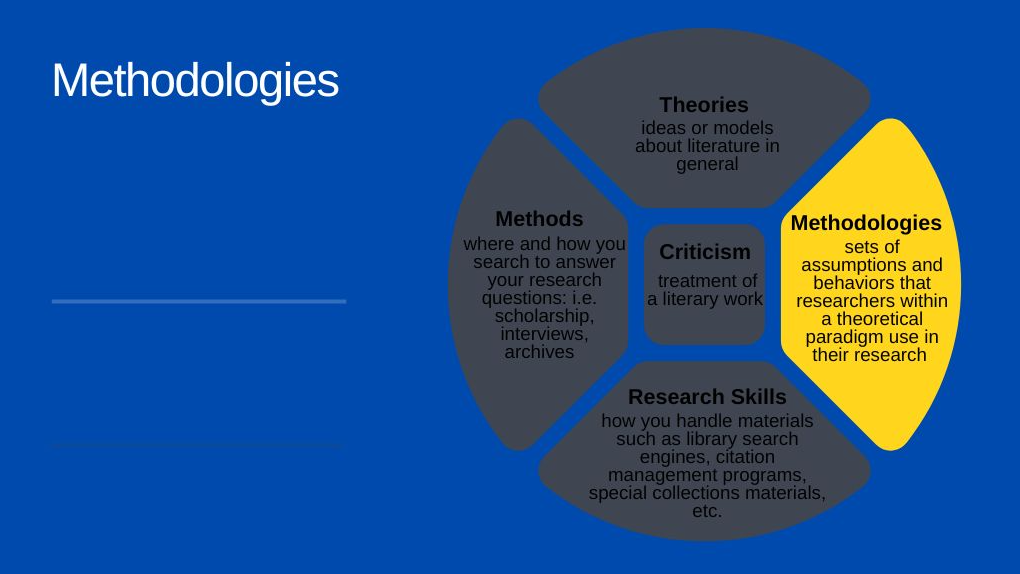Methodologies
Barry Mauer and John Venecek

We discuss the following topics on this page:
We also provide the following activity on this page:
 Methodologies
Methodologies
Methodologies (not to be confused with methods, which we discuss on the next page) are linked to literary theories. Methodologies are necessary to working with theories. They serve as the interfaces between theory (purely conceptual) and praxis (practical application). Methodologies consist of tools and lines of investigation: sets of practices and propositions about texts and the world. Researchers using Marxist literary criticism adopt methodologies that seek to understand literature and its relationship to the world by looking to material forces like labor, ownership, and technology. These researchers also seek to understand authors not as inspired geniuses but as people whose lives and work are shaped by social, economic, and historical forces. Daniel Hartley, in his “Marxist Literary Criticism: An Introductory Reading Guide” (2018) describes some areas of inquiry and methodologies used by Marxist literary critics.
 Example [Marxist Theory Methodologies]
Example [Marxist Theory Methodologies]
Areas of inquiry:
- Anthropological: investigates the social functions of art
- Political: investigates the link between literature and the political fortunes of classes and political systems such as capitalism and socialism
- Ideological: investigates the link between literature and identity
Methodologies:
- Genetic Structuralism: “Lucien Goldmann . . . examined the structure of literary texts to discover the degree to which it embodied the ‘world vision’ of the class to which the writer belonged. For Goldmann literary works are the product, not of individuals, but of the ‘transindividual mental structures’ of specific social groups. These ‘mental structures’ or ‘world visions’ are themselves understood as ideological constructions produced by specific historical conjunctures.”
- Dialectical criticism: Emphasizes “reflexivity and totality: it stresses the way in which ‘the [critic’s] mind must deal with its own thought process just as much as with the material it works on’ (Fredric Jameson); it holds that literary works internalise social forms, situations and structures, yet simultaneously refuse them (thereby generating a critical negativity that resists vulgar economic or political reductionism); and it takes the mediated (not external or abstract) social totality as its ultimate critical purview.”
Jada, in her research about James Baldwin’s story, “Sonny’s Blues,” uses both Marxist theory and Critical Race Theory (CRT). Below are some of the methodologies that CRT researchers use.
 Example [Critical Race Theory Methodologies]
Example [Critical Race Theory Methodologies]
Critical Race Theorists use a variety of methodologies, including
- Interest convergence: investigates whether marginalized groups only achieve progress when dominant groups benefit as well
- Intersectional theory: investigates how multiple factors of advantage and disadvantage around race, gender, ethnicity, religion, etc. operate together in complex ways
- Radical critique of the law: investigates how the law has historically been used to marginalize particular groups, such as black people, while recognizing that legal efforts are important to achieve emancipation and civil rights
- Social constructivism: investigates how race is socially constructed (rather than biologically grounded)
- Standpoint epistemology: investigates how knowledge relates to individual experience and social position
- Structural determinism: investigates how structures of thought and of organizations determine social outcomes
Wikipedia can help with finding methodologies. For instance, the page about Cultural Studies notes that the primary areas of study are about power, which consists of many other things (such as ideology, social relations, etc.) and discourse (the languages and world views found in and around texts). You can follow the citation links in wikipedia to research each methodology. Better still, use your library. Cultural Studies has subdivisions, which include New Historicism, Multiculturalism, and Postcolonialism. One methodology of Cultural Studies is radical contextualism, which “rejects universal accounts of cultural practices, meanings, and identities.”
Some psychological theories, such as Freudian and Lacanian, use a set of methodologies referred to as “symptomatic.” The analogy is to medicine and the ways in which doctors seek to diagnose a patient’s condition based on their presenting symptoms. Since many medical conditions can produce similar symptoms (for instance, chest congestion can be caused by a cold, the flu, COVID, and many other conditions), a doctor has to look closely at a set of symptoms, use their knowledge of various medical conditions and how they present, and reason abductively (from effects to causes) to figure out what the underlying condition is. Similarly, a Freudian or Lacanian reading of a literary text will look for clues related to the characters, narrator, author, or audience to determine what underlying conditions are present. These conditions may be cognitive (beliefs), affective (feelings), or interpersonal (relationships). They also can be a combination of these things.
Theorists don’t always label their methodologies as such. You need to look into each theory to see what positions the theorists take, what they study, and why. The “methods” part is about how they study. Not every methodology will work with every theory. You will need to do some research to discover with methodologies are most appropriate for your project.
 Exercises [Discussion]
Exercises [Discussion]
- What methodologies will you be using for your paper? Why did you make this selection over others? If you haven’t made a selection yet, which methodologies are you considering?
- What specific concepts from the methodologies are you most interested in exploring in relation to your chosen literary work?
- What is your plan for researching your methodologies?
- When you do your assignments for this week about theory and methodology, you should refer to your earlier work – the literature you chose, the problem, etc. We are in building mode. Recall that the methodology relates directly to the theory. You may need to do some additional reading to identify methodologies and theories.
- If there are any elements of your assignment that need clarification, please list them.
- What was the most important lesson you learned from this page? What point was confusing or difficult to understand?

